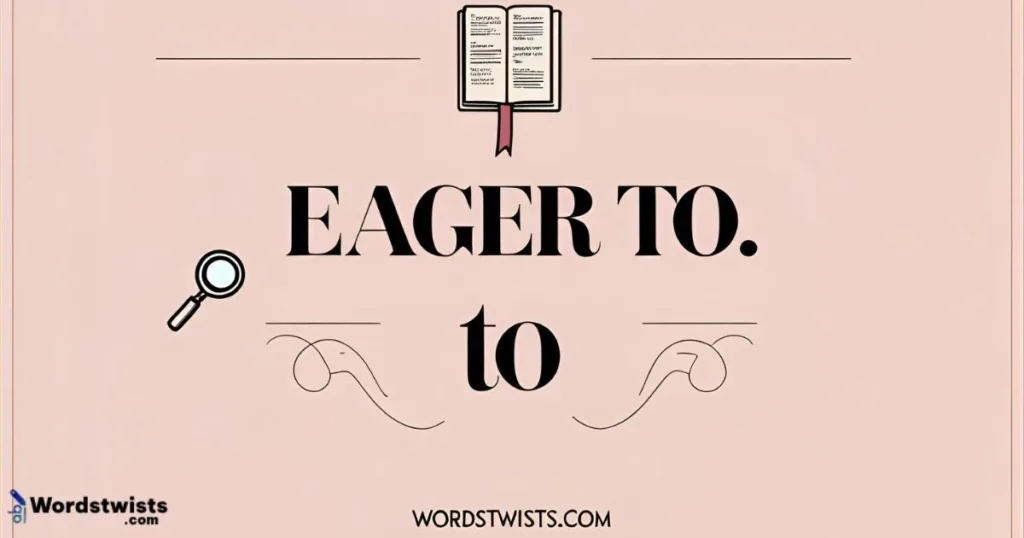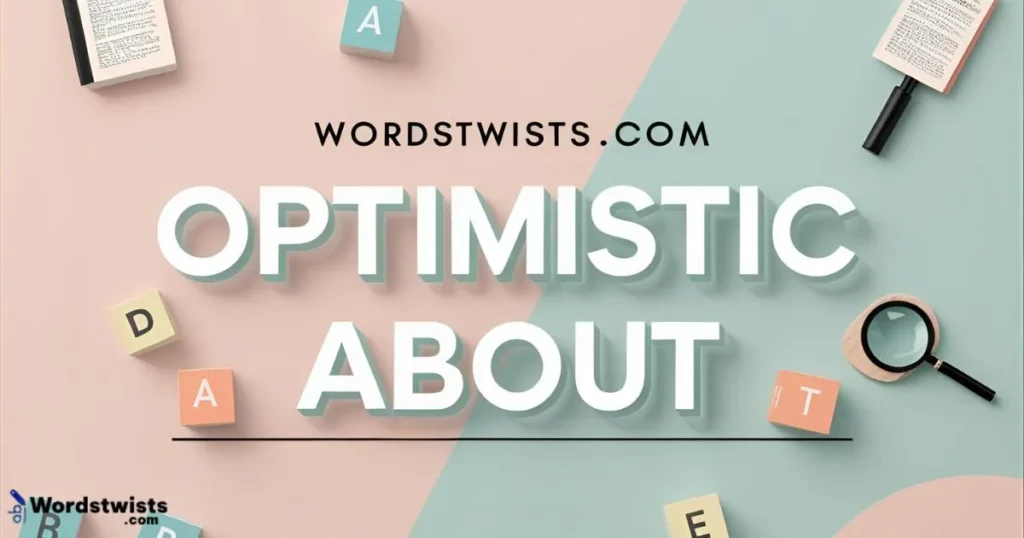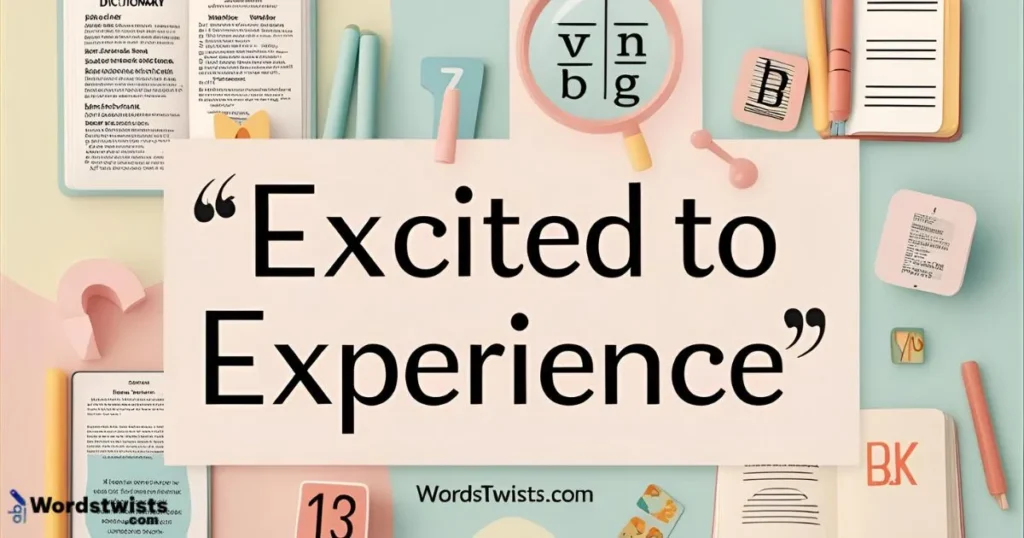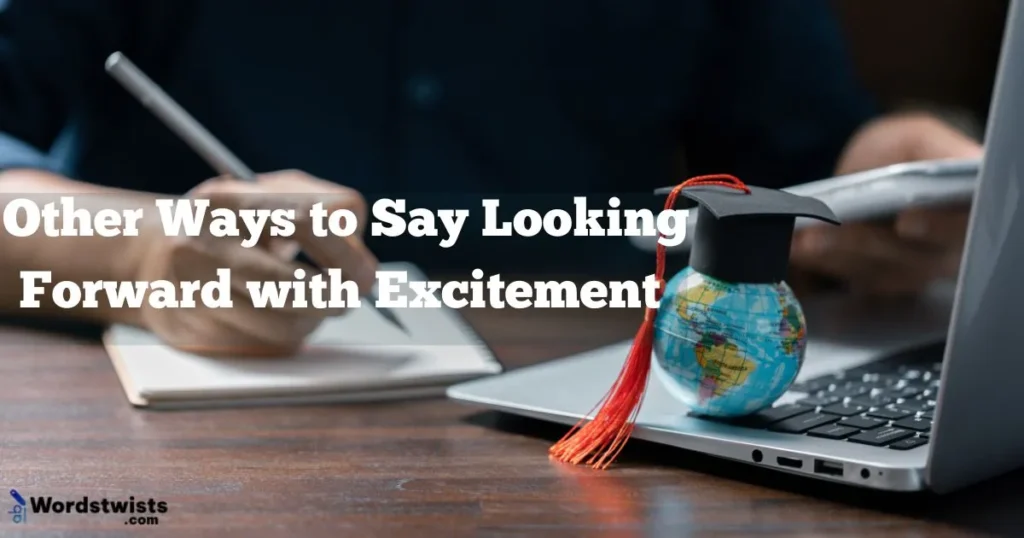We’ve all been there: writing an email, crafting a text, or even delivering a speech, and we find ourselves falling back on the same phrase: “I’m looking forward to…” While it’s a great go-to expression, using it too often can make your communication sound repetitive and a bit stale. That’s why it’s time to shake things up!
In this post, we’re diving into 25 compelling alternatives to the word “looking forward to” that will not only elevate your writing but also help you express yourself in fresh and exciting ways. Whether you’re composing a professional email, writing a personal letter, or simply trying to spice up your vocabulary, these alternatives will help you add personality, clarity, and style to your words.
Instead of using the same old phrases, you’ll discover a range of exciting options that will make your communication stand out with flair and precision. Ready to take your vocabulary to the next level? Let’s explore these 25 alternatives together and unlock the potential to express your thoughts in a more engaging and dynamic way.
Ways to “Looking Forward to”
1. Anticipating
Explanation: “Anticipating” conveys the idea of eagerly awaiting something in the future. It’s a great choice when you want to show a sense of excitement or expectation about what’s coming.
Usage Examples:
- I’m anticipating the meeting tomorrow to discuss our project.
- She’s anticipating a big promotion after all her hard work.
- The team is anticipating a successful product launch next month.
Why it Works: This synonym works because it expresses a stronger sense of excitement and expectation, making it more engaging than simply saying you’re “looking forward to” something.
2. Eager to

Explanation: “Eager to” emphasizes a keen interest or enthusiasm about an event or action that’s about to happen. It’s often used in more personal or informal contexts.
Usage Examples:
- I’m eager to hear your thoughts on the new design.
- We’re eager to begin the collaboration with you.
- She’s eager to see the outcome of the project.
Why it Works: This expression brings a strong sense of excitement and readiness, highlighting your genuine desire to participate in what’s to come.
3. Excited for
Explanation: “Excited for” adds an element of emotion and enthusiasm to the idea of looking forward to something. It’s perfect when you want to show that you are genuinely thrilled about an upcoming event.
Usage Examples:
- I’m excited for the concert this weekend!
- We’re excited for your upcoming presentation.
- They’re excited for the holiday season to begin.
Why it Works: It’s one of the most enthusiastic alternatives and is perfect for conveying high energy and excitement in both personal and professional contexts.
4. Can’t Wait for
Explanation: This is a more informal and relaxed way of saying you’re eagerly awaiting something. It’s often used when expressing impatience or enthusiasm for an upcoming event.
Usage Examples:
- I can’t wait for our trip next week!
- We can’t wait for the team to arrive.
- I can’t wait for the meeting on Monday.
Why it Works: This phrase conveys a sense of eagerness and impatience, making it a great way to express that you’re really excited about something coming soon.
5. Looking Ahead to
Explanation: “Looking ahead to” is a more forward-looking expression, which implies that you are preparing for or planning something in the future.
Usage Examples:
- I’m looking ahead to the next quarter’s goals.
- We’re looking ahead to a successful year.
- She’s looking ahead to the new challenges in her role.
Why it Works: This alternative adds a sense of purpose and forward-thinking to your message, making it suitable for professional or personal contexts.
6. Awaiting
Explanation: “Awaiting” implies a more formal and respectful anticipation of an event or action. It’s often used when you’re politely waiting for something to happen.
Usage Examples:
- I’m awaiting your reply to my email.
- We are eagerly awaiting your feedback on the proposal.
- She’s awaiting the final decision on her application.
Why it Works: “Awaiting” is a great option for formal communication, as it conveys respect and anticipation without being overly emotional.
7. Anxious for
Explanation: “Anxious for” expresses a nervous or excited anticipation, particularly when you’re waiting for something significant or important.
Usage Examples:
- I’m anxious for the results of the interview.
- She’s anxious for her test results to come through.
- They’re anxious for the event to begin.
Why it Works: It conveys an element of nervous excitement, making it more intense than simply saying “looking forward to.”
8. Thrilled about
Explanation: “Thrilled about” is a highly energetic way to express excitement for something upcoming. It’s perfect when you want to show that you’re extremely pleased or excited.
Usage Examples:
- I’m thrilled about the upcoming product launch!
- We’re thrilled about your upcoming visit.
- She’s thrilled about the news of her promotion.
Why it Works: This phrase brings enthusiasm and joy, making it ideal for personal or celebratory contexts.
9. Delighted to
Explanation: “Delighted to” conveys a sense of happiness and pleasure at the prospect of something happening. It’s often used in more formal settings, such as in business emails.
Usage Examples:
- I’m delighted to hear that we’ve reached an agreement.
- We are delighted to host you at our event next week.
- She’s delighted to be part of this new initiative.
Why it Works: “Delighted to” has a more refined tone, making it suitable for formal communication or when you want to express sincere pleasure.
10. Optimistic about

Explanation: “Optimistic about” implies hope and positive expectation about a future event or outcome. It’s ideal when you want to express confidence in what’s to come.
Usage Examples:
- I’m optimistic about the outcome of the project.
- We’re optimistic about the market’s response to the new product.
- She’s optimistic about the upcoming conference.
Why it Works: This alternative expresses positivity and confidence, making it great for professional settings.
11. Expecting
Explanation: “Expecting” suggests a sense of waiting for something with confidence and readiness. It often carries the assumption that the event is highly likely to occur.
Usage Examples:
- I’m expecting the package to arrive tomorrow.
- We’re expecting an important update after the meeting.
- She’s expecting a call from her colleague later today.
Why it Works: This word conveys a practical approach to anticipating an event, focusing on the certainty or probability of it happening.
12. Excited to See
Explanation: “Excited to see” is an enthusiastic way to express your eagerness to witness something in the near future, making it ideal for situations involving events or people.
Usage Examples:
- I’m excited to see the new artwork at the gallery.
- We’re excited to see the final version of your report.
- She’s excited to see the team’s progress in the coming weeks.
Why it Works: This expression adds a personal touch to your anticipation, focusing on what you’ll directly experience or observe.
See Also: Other Way to Say “Happy Birthday”
13. Pumped for
Explanation: “Pumped for” is a very informal expression, often used when you’re really excited or energized about something. It’s best suited for casual or enthusiastic settings.
Usage Examples:
- I’m pumped for the concert tonight!
- We’re pumped for the weekend trip to the mountains.
- She’s pumped for the big game this Saturday.
Why it Works: This is a high-energy alternative that communicates excitement in a casual, informal way. It’s a great choice for social or youthful settings.
14. Excited to Experience

Explanation: “Excited to experience” focuses on the sensory or emotional enjoyment you expect to have during an upcoming event. It works well for highlighting unique experiences.
Usage Examples:
- I’m excited to experience the new restaurant in town.
- We’re excited to experience the festival atmosphere this weekend.
- She’s excited to experience the thrill of the roller coaster.
Why it Works: This phrase conveys a sense of immersion in an event or situation, making it particularly useful when talking about experiences you’ll engage with directly.
15. Hopeful for
Explanation: “Hopeful for” implies a positive yet cautious expectation. It’s ideal for expressing optimism about a future outcome that is not guaranteed but is desired.
Usage Examples:
- I’m hopeful for a quick resolution to the issue.
- We’re hopeful for a successful partnership.
- She’s hopeful for the promotion after her review.
Why it Works: This alternative expresses optimism while acknowledging uncertainty, making it a great choice for situations that are uncertain but promising.
16. Looking Forward to Connecting
Explanation: “Looking forward to connecting” is commonly used in professional contexts, especially when meeting someone for the first time or engaging in collaboration.
Usage Examples:
- I’m looking forward to connecting with you next week.
- We’re looking forward to connecting during the conference.
- She’s looking forward to connecting with the new clients soon.
Why it Works: This expression is professional and polite, perfect for networking or initiating conversations with others.
17. Eager to Begin
Explanation: “Eager to begin” is an active alternative to “looking forward to,” particularly when you’re ready to start something important or exciting.
Usage Examples:
- I’m eager to begin our new project next week.
- We’re eager to begin the collaboration with your team.
- She’s eager to begin her new role.
Why it Works: This phrase emphasizes your readiness and excitement to start something, showcasing a proactive attitude.
Learn More: Other Ways to Say “Mind Your Own Business”
18. Ready for
Explanation: “Ready for” emphasizes preparedness and anticipation. It’s a straightforward and easy-to-use expression to show that you’re geared up for an event or situation.
Usage Examples:
- I’m ready for the presentation tomorrow.
- We’re ready for the upcoming challenges in the new project.
- She’s ready for the final exam after all the preparation.
Why it Works: “Ready for” is versatile, making it suitable for both professional and casual contexts where you want to show that you’re mentally and physically prepared.
19. Keen on
Explanation: “Keen on” is a British expression often used to show that you’re excited about or interested in something. It works well for both formal and informal communication.
Usage Examples:
- I’m keen on trying the new software.
- We’re keen on launching the product by next month.
- She’s keen on attending the event this weekend.
Why it Works: It’s a lively and engaging alternative that shows enthusiasm and interest, making it suitable for a wide range of settings.
20. Stoked for
Explanation: “Stoked for” is another informal and energetic expression, often used when you’re really excited about something upcoming. It’s perfect for social events or casual conversations.
Usage Examples:
- I’m stoked for the weekend!
- We’re stoked for the team-building event next month.
- She’s stoked for the summer vacation.
Why it Works: This phrase is informal and full of excitement, perfect for conveying high energy in a relaxed setting.
21. Fired Up for

Explanation: “Fired up for” expresses strong enthusiasm and eagerness, typically used when you are preparing for an action or event that requires a lot of energy or passion.
Usage Examples:
- I’m fired up for the big match this afternoon.
- We’re fired up for the upcoming conference.
- She’s fired up for the release of the new product.
Why it Works: It’s an energetic and motivational phrase that conveys a sense of drive and excitement.
22. Pleased to
Explanation: “Pleased to” is a polite and positive expression, great for formal communication. It’s used when you want to show that you’re happy to participate in or experience something.
Usage Examples:
- I’m pleased to assist you with this project.
- We’re pleased to announce the launch of our new service.
- She’s pleased to be part of this exciting venture.
Why it Works: This is a more reserved and polite alternative that still conveys positive anticipation without excessive enthusiasm.
23. Excited for What’s Ahead
Explanation: This phrase expresses optimism and excitement about the future in a more general sense, often used in a motivational or forward-thinking context.
Usage Examples:
- I’m excited for what’s ahead in the new year.
- We’re excited for what’s ahead with the new partnership.
- She’s excited for what’s ahead in her career.
Why it Works: It works well when you want to express excitement not just for a specific event but for the overall future or upcoming opportunities.
24. Ready and Waiting
Explanation: “Ready and waiting” implies that you’re not just prepared for something, but actively anticipating it. It’s often used to convey a sense of eagerness or readiness to act.
Usage Examples:
- I’m ready and waiting for your call.
- We’re ready and waiting to start the next phase of the project.
- She’s ready and waiting for the green light to proceed.
Why it Works: This phrase combines readiness with anticipation, making it ideal for both professional and personal contexts when you’re ready to move forward with something.
25. Can’t Help but Be Excited for
Explanation: This expression adds a bit of emotion, showing that your excitement is almost uncontrollable. It’s useful when you want to convey a heightened level of enthusiasm.
Usage Examples:
- I can’t help but be excited for the upcoming concert!
- We can’t help but be excited for the new product launch.
- She can’t help but be excited for her birthday celebration.
Why it Works: This phrase emphasizes strong emotions and makes your excitement seem even more genuine, adding a personal touch.
Conclusion
Now that you have 25 vibrant alternatives to “looking forward to,” you can add new energy to your communication, making your writing and speech more engaging and varied.
Whether you’re speaking casually with friends or crafting a professional email, these expressions will help you avoid repetition and convey your enthusiasm in fresh and impactful ways. So next time you’re about to write or speak, try one of these alternatives and watch your communication skills soar!

I’m Leo Knox, the wordplay wizard behind WordsTwists.com where I turn everyday meanings into funny, clever, and creative twists. If you’re tired of saying things the boring way, I’ve got a better (and funnier) one for you!


